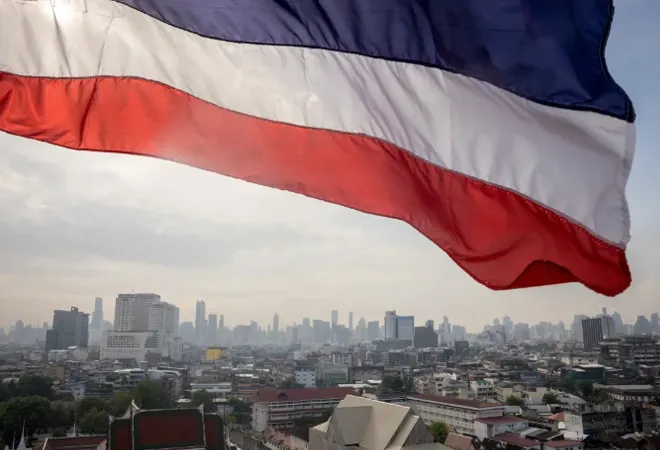-
CENTRES
Progammes & Centres
Location
Interventions by the military-royalists continue to impede Pita Limjaroenrat’s bid to become the next PM, thus posing serious challenges to Thailand’s democratic progress
 For the past month, a persistent dilemma has marred Thailand's political landscape in appointing a new Prime Minister (PM), significantly impacting the country's governance and stability. The 14 May election saw the victory of the Move Forward party, backed by young voters seeking an end to military-influenced administration. However, their political hero, Pita Limjaroenrat, has been rejected twice from becoming the head of the state by the military and royal loyalists, leading to a political limbo and uncertainty.
For the past month, a persistent dilemma has marred Thailand's political landscape in appointing a new Prime Minister (PM), significantly impacting the country's governance and stability. The 14 May election saw the victory of the Move Forward party, backed by young voters seeking an end to military-influenced administration. However, their political hero, Pita Limjaroenrat, has been rejected twice from becoming the head of the state by the military and royal loyalists, leading to a political limbo and uncertainty.
Each coup played a crucial role in shaping the nation’s political landscape, often resulting in significant changes to the Constitution and governance structures.The nation's political system is characterised by a delicate balance of power between elected officials and unelected institutions, particularly the military and the monarchy. Since 1932, Thailand has witnessed 22 military interventions or coups, 13 of them successful leading to significant disruptions in governance and undermining the country’s democratic development. Each coup played a crucial role in shaping the nation’s political landscape, often resulting in significant changes to the Constitution and governance structures. The current Constitution, adopted in 2017, gives power to the military, whereby unelected senators aid in choosing the nation’s future leader. As a result, selecting a PM is mired in complexities and controversies.
The recent decision places substantial weight on nominating a candidate, with limited opportunity for subsequent negotiations based on the candidate's initial support.During Pita's initial bid on 13 July, he fell short by more than 50 votes, with only 13 senators backing him. Subsequently, the following week, he was prevented from making a second attempt as Parliament voted to disallow him from submitting his name again for the prime ministerial candidacy. The recent decision places substantial weight on nominating a candidate, with limited opportunity for subsequent negotiations based on the candidate's initial support. Moreover, it indicates that candidates holding a liberal ideology may face challenges in securing significant positions within the political arena. A substantial number of senators appointed by the previous military administration have expressed their reservations about Pita’s stance on amending the controversial Section 112 of the Thai Criminal Code, known as lèse-majesté, which imposes severe penalties for defamation of the monarchy and has been widely criticised for its alleged misuse as a political tool. On 3 August, the Constitutional Court announced it would take additional time to deliberate on accepting a petition from the state ombudsman, which questions the constitutionality of the Parliament's decision to bar Pita from being nominated as a prime ministerial candidate for the second time. A joint sitting of the Parliament is scheduled for either 18 or 19 August to decide whether to consider the petition regarding the renomination of the Move Forward leader for the prime minister's position or whether to suspend the selection process.
One of these cases accuses Pita of violating the Constitution by allegedly holding shares in a media company while running for office.Despite the court ruling, Pita Limjaroenrat’s chances of being nominated for the prime ministerial position again appear unlikely. The Move Forward party faces multiple legal challenges, which its supporters view as tactics that political rivals are using to maintain their grip on power. One of these cases accuses Pita of violating the Constitution by allegedly holding shares in a media company while running for office. Due to these legal issues, he was suspended from Parliament during the debate on his second nomination.
Srettha emphasises the significance of addressing economic and social inequality as pressing issues that demand immediate attention and resolution.The Pheu Thai intends to nominate real estate tycoon Srettha Thavisin as their candidate, reflecting their attempt to appeal to the business community and portray him as a representative of moderate liberal principles. Srettha emphasises the significance of addressing economic and social inequality as pressing issues that demand immediate attention and resolution. He possesses valuable experience in governance, a comprehensive vision, and excellent communication skills that resonate well with the public, including the younger demographic. The decision to form new coalitions without a clear understanding between the majority parties further complicates the party dynamics, since losing Move Forward party's 151 seats may limit Pheu Thai's options for forming a coalition government. This leaves Pheu Thai in a complex and precarious position though they still remain hopeful. Also, the Pheu Thai party needs to be mindful of the other two candidates they have in mind —Paetongtarn Shinawatra, the daughter of former Prime Minister Thaksin Shinawatra, who was ousted by a 2006 military coup; and Chaikasem Nitsiri, the party's chief strategist—in case their first option of Srettha Thavisin becomes ineffective. The party’s association with Thaksin’s planned return to Thailand later in August or September could further impact the political landscape.
The ongoing political dilemma underscores the need for comprehensive reforms and inclusive dialogue to strengthen democratic institutions and promote national unity in Thailand.At a critical juncture in its history, Thailand has the potential to emerge as a more robust and stable nation with genuine efforts to address social and economic disparities, reconcile political differences, and empower democratic institutions. However, the military-royalists may continue to exert influence and dominance in the political environment, posing serious challenges to achieving lasting stability and democratic progress.
The views expressed above belong to the author(s). ORF research and analyses now available on Telegram! Click here to access our curated content — blogs, longforms and interviews.

Sreeparna Banerjee is an Associate Fellow in the Strategic Studies Programme. Her work focuses on the geopolitical and strategic affairs concerning two Southeast Asian countries, namely ...
Read More +